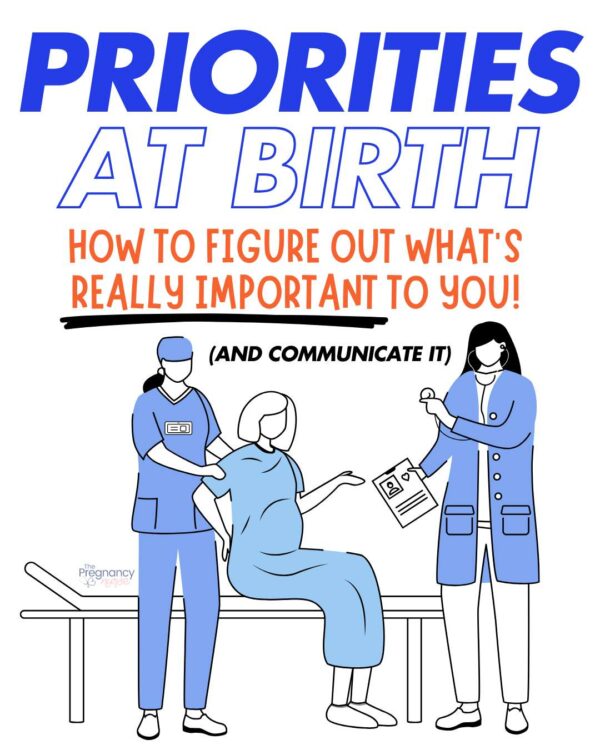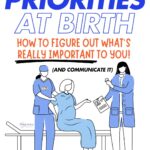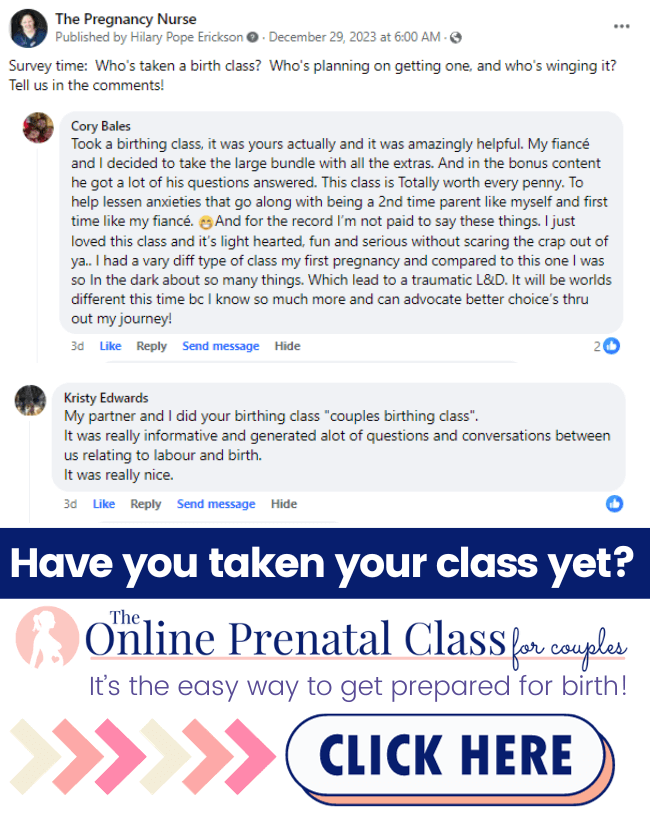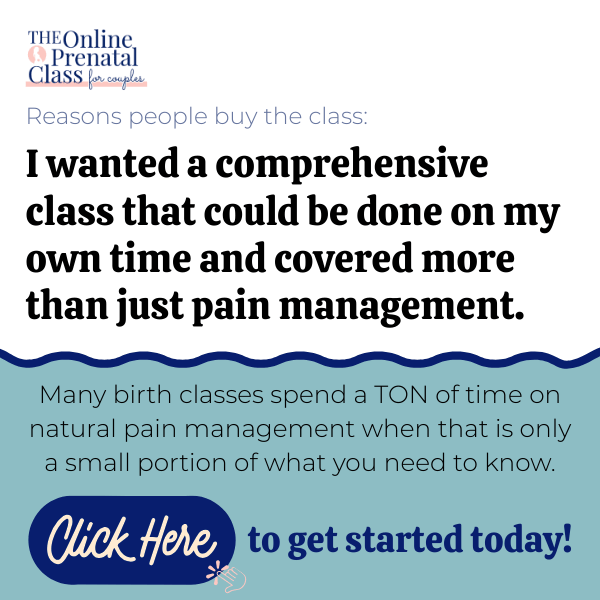👋 I’m so glad YOU are here. Are you looking to also get your partner prepared? This is for BOTH of you. Couples just love it and I know you want to both feel prepared!
I know we love phrases like birth plans, birth preferences and birth wishes — but the reality is that we have to make clear what our priorities are. When we do that it sort of helps the other things “fall in line” (although you can have an odd-man out). Today I want to talk about understanding your birth priorities and how to make them clear to yourself, and also to your team.
I have a friend who, when she took her birth class, was asked to write down all the things they hoped for their birth. She then told them to rip them up and save just one of them. For her, it was skin to skin time after baby was born and she did get that, and felt good about how things happened, even though much of it didn’t go to plan (including an unplanned cesarean).

Birth plans are often full of lots of hopes and dreams, which I love. We should have lots of hopes and dreams for this little one. We gotta shoot high as we raise these new little humans. However, it also helps to have over-arching priorities that we are clear on that matter the most.
It might be fun to do a post on Pulling Curls about parenting priorities (like keeping baby safe), but for today we’re going to talk about pregnancy priorities.
So, the first question:
What’s your top priority?
Most often you’ll hear that the top priority is a healthy mom and a healthy baby.
This isn’t always true, that may truly not be your top priority, and that’s fine too — I’m just speaking to my experience with thousands of patients.
I also get a lot of flack online that this is the “bare minimum” — but in reality that is sometimes what you achieve as a parent. I have many bare minimum days as a mom….
You put your baby in a safe sleep space but they cry more than you wish, you’re sleeping less than you need and you feel fairly miserable some of the time.
But, I think it’s smart to put this down as your #1 priority. To remember that really is what’s most important, even if you hope for a lot more.
So often I see people online saying how upset they are that baby had to go to the NICU and they weren’t able to hold them for 4 hours because of all the testing and needs the baby had by the NICU team.
And I’m not saying that isn’t INCREDIBLY hard, but when you remember that top priority is that baby is healthy you realize that the other priorities just aren’t as important.
Now, if you believe baby was in the nursery but didn’t need to be that’s a whole other bag of chips — learning to communicate with your healthcare team should be a priority during pregnancy and learning to that can help in numerous situations. I recommend this class where a pro teaches you to do just that.
So – yes I want you pull-out a piece of paper, or your notes app and I want you to start a list of birth priorities. Put your #1. It may not be that one, but I want you to put down what is TRULY most important to you.
Some people think they can detach “healthy mom & healthy baby” putting baby healthy is #1 but I will remind you that wrapping baby in a very sick mom isn’t a good idea. We don’t choose one over the other at the hospital, so you can put that notion out of your head.
I want to also say that everyone’s idea of “healthy mom & healthy baby” looks different. To me that is delivery in a hospital where they can accommodate any emergency.
For some other people it looks like a home birth with a great midwife (I love home birth stories, but I have to admit that my history makes me very nervous about them).
For some people that looks like free birthing.
I honestly think that all of these people still have that priority, and for some reason they believe that delivering without assistance is the safest way. As a note, I take responsibility for that as a women’s healthcare provider — we have to do better to accommodate people’s wishes.
Want to know more about birth — check out these posts:
- What a Birth Plan Can ACTUALLY Do For Your Birth?
- What do People Wish They Had Known About Before Birth?
- Advocating For Yourself in Labor
- 5 Things You CAN Control in Labor (mostly)
- Planning for Bump to Bassinet: Must-Have Resources for Expecting Parents
Other Birth “Values”
After that big one, our birth “values” differ a lot. I want to share 3 themes that I’ve seen in birth “values”, and maybe you’ll identify with some of these.
I want you to think of these are over-arching things that sort of guide your birth. Like, if you’re a democrat you often vote that way on the ticket (even though that’s a pretty bad metaphor this time of year).
Personally, I’m an independent so I very much pick and choose what’s important to me down the ballot and in birth — but I think it helps to know what other people are thinking in labor.
It’s also OK if you don’t know, and you honestly don’t have a clue what you want. If that’s you (and honestly, even if that’s not you) I recommend taking a birth class to get more clear on what’s going to happen at your hospital delivery. I recommend this one. It’s taught by an expert RN and doesn’t take over your life which I think is important.
Mother Nature Knows Best
Many people have as a core belief that when we do as little messing with mother nature, the better things turn out.
It may surprise you that I am one of these people. I’m not a fan of induction and I look for extremely conservative providers who don’t look to do more than is absolutely necessary.
Things that might be important to you:
- No inductions
- No breaking your water until later into labor
- Staying at home until you’re well into active labor
- Allowing movement in the delivery room
- No/less pharmacological pain management options
- Pushing as you’d prefer rather than regimented pushing (I have a whole post on how to push here you might find helpful).
- Avoiding a cesarean section as much as possible
You may also consider refusing medications, or a circumcision or a bath for the baby.
For every family how this looks is different. But, maybe you feel like mother nature knows best. That can be one of your values and then your priorities fall in line behind that.
No Epidural
Some people really don’t want an epidural. They go-in hoping for this and make all efforts to avoid it.
That can look like:
- Avoiding induction (because it lengthens labor and makes it more likely you’ll want an epidural)
- Staying at home as long as you can so you’re not “tied down” at the hospital as long.
- Using movement to your advantage during labor
- Possibly intermittent auscultation to allow for that movement.
- Asking your providers not to talk about it and you’ll bring it up if you want it.
For me, I was actually a “mother nature knows best” but I got an epidural. I was tired, and I knew I was already very anxious about the whole process if we added the pain it would be very difficult for me to remain calm and enjoy my new baby.
You can make a combo of any of these values…. Just like any good pizza chain. 🙂
Want to know more about labor pain — check out these posts:
- Epidurals During Pregnancy & Labor
- How Many CM Do You Need to Be to Get An Epidural?
- Weird Side Effects from The Epidural That No One Talks About
- What to Do If You Can’t Decide if You Want an Epidural or Not?
- Is a “Walking Epidural” A Real Thing?
My Doctor Knows Best
Maybe you’re up for whatever your doctor recommends. I love that you trust them like this!
Hopefully, you’ve picked a provider that aligns with you (I always picked a very treatment-conservative provider who was willing to speak-up if they saw a big need). You trust them, and you really think they’re trained to do the right thing.
Honestly, we don’t like to think of it, but your provider (whether you like them or not) could very well hold your life in their hands. It’s rare, but it can happen — so you at least want a provider that you think will make the good choices if the chips are down.
But, there’s a lot of people who just want to hear their doctor’s recommendation and go with it.
I love that trust. However, sometimes they give you options that are equally fine — at which point those other priorities come in.
Ok, now that we’ve gotten the values out of the way — what are your next priorities? I want to share 10 that I’ve seen people be very fond of that might help you think of your own.
Again, this isn’t cut and dry but it helps you know what’s important to you. It helps you think about birth and get started making choices for yourself, which I think is SO important.
Quick note: I really do think that one of your most important things to make a choice on is what birth class you’re going to take. Personally, I took a hospital class that just sucked and while it checked off “take a class” it didn’t prepare me at all. I recommend this class — it’s so much better than I did for myself!
Birth Priorities
Again — these are going to be different for everyone. You may think some of them seem crazy, but remember everyone has had different traumas and background in their lives. Hospitals are meant to accommodate them all (I hope).
I would also encourage you to share these birth priorities with your healthcare team. When we know what’s important to you, we can make them important to us too! Share them early and often!
This is actually something I recommend with all “birth plans” and while this one has more specifics than what we’re talking about in here thousands of couples have found this birth plan series helpful:
Avoid the Hospital
Some people want to avoid the hospital as much as possible. This may be:
- Delivering at home
- Delaying going to the hospital
- Leaving early after baby is born
They may have had a loved one die in a hospital, or previous poor experiences with the hospital and it really makes them uncomfortable.
All of this is fair and valid. I hate hospitals, I get this.
Want to know more hospital tips — check out these posts:
- My #1 Tip for Hospital Birth
- What To Do If Your Labor Goes Long?
- How a Birth Class Changes Pregnancy, Labor, Birth & Life With Baby
- The MOST Traumatic things in Labor & Delivery
- Considering a VBAC: What to do
No Needles
Maybe you just hate needles, so you’d like to avoid them at all costs.
This may mean less/no labs, no IV and no shots or epidural.
This is one I would definitely bring up with your provider early on. The unfortunate news is that if you want the “healthy mom & healthy baby” you are likely going to need to confront this fear a few times during your pregnancy.
There are very important labs during pregnancy, including the glucose test. I am also a huge fan of at least having a saline lock at birth “just in case”.
So, again — talk with your provider on this, and maybe consider some therapy to get a toolbox of tools to manage this fear.
I actually went to therapy for my fear of flying (I had an uncle that died in a plane crash that triggered it in my 20’s) and it really helped. She gave me some audio snippets to listen to on a few flights and slowly I stopped needing them or being bothered by turbulence much. I am really glad I did it.
No Induction
Some people want to avoid an induction at most costs. Of course, everyone is balancing everyone’s health but I really tried to avoid induction myself.
The reality of L&D is that most cases are not cut and dry. We may slightly recommend one option over something else, but the choice is ALWAYS yours.
I can 100% promise your provider is NOT going to show-up at your home and drag you to the hospital. If you choose to refuse the induction they’ve scheduled please do call the hospital to let them know you’re not going to be there as a courtesy for their workplace.
I actually did a whole podcast episode on choosing if an induction is right for you.
If you’d really like to avoid an induction, let your provider know that and then have a frank discussion on the risks you’re facing and then make the best choice for yourself on that day.
The good news is there’s often time to change your mind.
Oh, and keep doing those kick counts (don’t know what I’m talking about — grab my cheat sheet here):
Want to know more about inductions — check out these posts:
- 5 Things NOT to do Before Your Induction
- Pitocin to Induce Labor
- Inducing Labor at 39 Weeks: Pros and Cons
- What Happens if Your Induction Doesn’t Work?
- 5 Reasons to NOT Get Induced
Employ Natural Pain Management
Some people really want to avoid the epidural, and some also want to avoid IV pain meds or nitrous (or anything else the hospital offers).
I have a whole post that addresses this more called How to have a “natural” hospital birth (also talks about avoiding induction).
That post gives tips on how to make that happen for you.
I think it’s pretty important to think how important this actually is for you.
My experience is that a lot of people hope to not need the epidural, but then end up getting it in the hospital, which is fine.
You have no idea how painful labor will be — so when it comes, the majority think — “no thanks” and ask for an epidural.
However, if it IS really important to you I think taking a natural pain management class is a must. This one has it included.
You’ll want to have multiple tools in your “toolbelt” to manage the pain when it gets tricky. You’ll also want to know about the labor stages so you can have an idea what to expect of your body as you progress.
All About Birth Environment
Some people really want the birth room to be a specific way.
The great news is that hospitals are much more accommodating to this than they used to be.
Just be aware the hospital can refuse specific things. Here are a few things I’ve seen online that the hospital may say no to:
- Bringing labor tubs into the hospital (I honestly can’t imagine a hospital OK-ing this, unless it can be inside their own tubs).
- Fairy lights in the room (could be a fire hazard)
- Temperature (we have rules about how warm/cold a room can be for safety reasons)
I have a whole post on things you can’t refuse at the hospital that goes into some of the rules you may not have thought about.
BUT I think including these on your birth plan is super cool. Maybe just sum it up in specific words like quiet, dark, or what type of sounds you’d like playing (or music).
I was always happy to accommodate these (as long as it’s safe — you will likely have some light in your room so no one — especially your nurse — doesn’t trip). And it also made me super happy to know this rather than turning lights on and off trying to assess how they liked things.
Along these lines you may also have something you want to wear during labor. Asking questions about what you can/can’t have at your birth is an awesome thing to do at your hospital tour.
Skin to Skin
Most often baby is brought to your chest. At that point I most often encourage you to just love your baby, look them over and meet who you’ll spend the rest of your life worrying about. 🙂
This gets trickier in the OR (if you have a cesarean birth), but telling us it’s a priority helps us work around things.
Here is my reminder that sometimes things that WERE a priority don’t end-up being one at the time. Sometimes skin to skin sounds magical until you’re having a panic attack that you’re in major surgery. Everyone is different, and allow yourself to change your mind by what you want in the moment.
Prioritize Breastfeeding
Some people want to breastfeed right away, and want to prioritize it over sleep, or their own healing in some cases.
With my first breastfeeding didn’t work. I worried it was something I did wrong on my first, so I prioritized early latching and trying as much as we could to make breastfeeding work. Fun fact, it ultimately did not work — but in my head I wanted to give it as hard a shot as I could.
I think it’s super important for a couple to talk about how “married” they are to breastfeeding before baby is there. Partners will often be surprised that one is much more for it than another and it’s good if they get on the same page by discussing why it’s important to each person.
We actually review this in the couples questions in here so you’re not caught by surprise.

Involve Partner
Some people really want their partner involved, and some partners really want to be involved.
We love that at the hospital, but we’re often reticent to really involve them because a lot of partners do NOT want to be involved in birth.
So, telling us your partner is really wanting to help is awesome. They can do things like help change your position, change pads underneath you, help position the monitor. Honestly, there is a ton they can do if they just ask and step up to the plate!
Here’s some of my best partner tips you might find helpful:
Limit Exams
A lot of people want to limit exams. Somehow the internet has made people think you can easily refuse all exams, although that’s pretty rare.
BUT, we can definitely limit them. Especially in cases like:
- Re-checking just to see how things are going
- Double-checks by a nurse in training
- Doctor is coming in soon, let them just do it
Letting us know it’s a priority is a win for all of us. It also sometimes allows us to think ahead a bit more and really tailor it all to your needs.
Want to know more about exams — check out these posts:
- What do the Cervical Exam Numbers Mean?
- Can You Refuse Cervical Exams with Nurse Chantel
- What Does the -2 Mean When They Do a Cervical Check?
- Painful Cervical Checks During Pregnancy: What to do if you’re scared
- Pain After Your Cervical Check: What’s it mean?
Free Flow.
Maybe you’re looking to just let labor come as it wants to.
You’re educated about what can happen, and ready to make choices as it comes — but you’re ready to let it be what it’s going to be.
Honestly, these are my favorites (for the most part, I spend a lot of time asking these types of people what they want).
Was I this? Absolutely not (although I am working on being more like this in general — I think my life would run more smoothly).
But I really think these people end-up with the best outcomes.
This isn’t to say you just let “whatever” happen to you in labor. You’re engaged, you’re making choices but you’re aware you have no control in this situation — and that’s OK with you.
Now, I just wanted to give you some examples of birth priorities. I really think you can only pick a few of these and really work towards it, if that’s what you want to do. Or, be free-flow. It’s just not in my personality. 🙂
But, the MOST important priority needs to be getting educated on what to expect.
It’s easy to think that it will be so easy to manage the pain because you rarely take tylenol, only to be blindsided by what labor actually looks like.
It can be easy to think you don’t need help or a support system postpartum, only to be blindsided by how much it is taking out of both of you, and you could really use assistance….
When I took my birth class in my delivery hospital (pre-working L&D) I was blindsided by SO many things because the class just wasn’t good. I don’t want that for you. I want a high quality class that can really help you both get prepared!
The Online Prenatal Class for Couples was created to:
- Be fast and efficient so you’re not spending your life in this class
- Make you a team rather than your partner being just a cheerleader
- Get prepared with an expert and a mom to three who really knows what you need to know.
Come get prepared with me right here.
Want to do a vibe check before diving into the whole thing with me? — check out my free labor pro tips. It’s your first step toward getting in the driver’s seat of your birth.








 How To Have A Natural Hospital Birth
How To Have A Natural Hospital Birth
